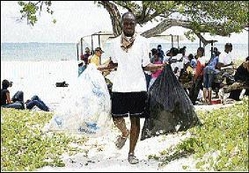
Otis Johnson, a past student of St Jago High School, carries bags of garbage removed from the beach during National Environment and Protection Agency's International Coastal Clean-up Day at the Half Moon Bay Beach in Hellshire, Portmore, St Catherine, on September 19. More than 200 people, including church groups, schools, environmental clubs and organisations volunteered their services in the four-hour exercise. - Anthony Minott/Freelance Photographer
WESTERN BUREAU-
With tourism being the main foreign exchange earner for Jamaica, national projects coordinator for the Negril Area Environmental Protection Trust, Sandra West, is calling for the concerted efforts of Jamaicans to protect the environment in order to sustain the tourist industry.
West was one of four speakers who addressed a lunch-and-learn seminar dubbed, 'Climate Change: A Challenge For Jamaica Maritime Too'. The seminar was held at The Pelican Restaurant in Montego Bay, St James, last Friday.
West said Jamaica's natural environment was one of the main attractions for visitors. But she said the performance of the sector could be compromised because of the deterioration of the natural environment.
"Sixty-five per cent of all species in the Caribbean depend to some extent on coral reefs. The collapse of the coral reefs may have widespread impact on fisheries and maritime tourism and we'll certainly lose our bio-diversity," she said. "With the increase in ocean temperature, there will be an increase in vector-borne diseases especially those from mosquitoes."
Outbreak
West asserted that the outbreak of vector-borne diseases would lead to less snorkelling and other underwater activities by tourists.
She explained that the rise of seawater levels could result in a loss of revenue for Jamaica.
According to the environmental advocate, the rising levels could cause the sea water to mix with fresh water sources.
"Some of the cruise ships that come in to Jamaica dock to replenish their supply of fresh water. So should we lose our fresh water or a good majority, we will not be able to supply them with fresh water, hence we'll see fewer ships coming into the ports."
West said the rising water levels could also encourage coastal erosion which could lead to higher insurance costs for properties along the coastlines.
The lunch-and-learn seminar was organised by the Shipping Association of Jamaica as part of the activities for Maritime Week.
Other speakers included Jean Brown, president of the Negril Coral Reef Preservation Society; David Miller, operations manager at Montego Bay Marine Park, and Jeffrey Spooner, manager of the Meteorological Service.
All four speakers called for greater responsibility to protect the environment.
Maritime Week is an annual undertaking which seeks to educate and inform people in the shipping industry and other related fields, about the effects of climate change and other environmental problems affecting the sector.